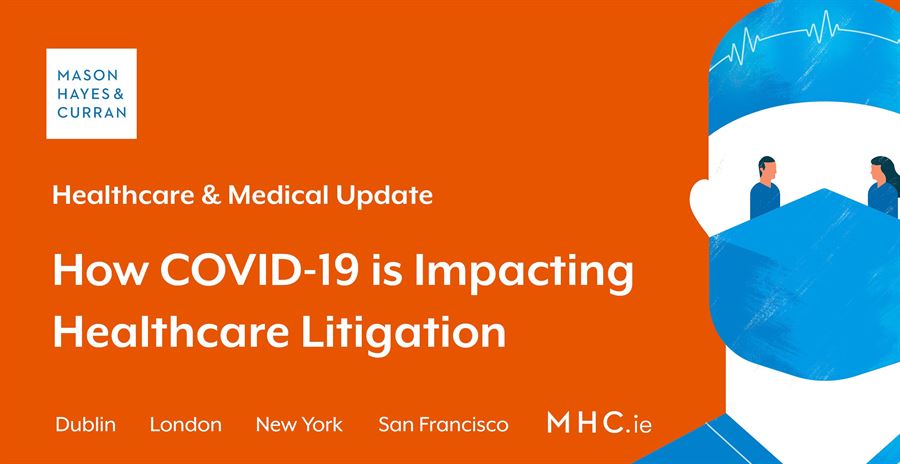
COVID-19 has placed the world in virtual lockdown. In an effort to mitigate the spread of the virus, the Irish government introduced travel restrictions limiting travel to essential travel only. Attending medical appointments is listed as an exception. We explore how the ongoing travel restrictions might impact the medico-legal examination of plaintiffs which is a necessary step in the litigation process. We also discuss the challenges facing legal practitioners in progressing healthcare litigation where the Courts Service has been scaling back its operations unless urgency can be demonstrated.
Medico-legal examination of plaintiffs
Where a a claim is brought for personal injury arising out of alleged medical negligence on the part of a healthcare provider, it is necessary for both parties to the case to arrange for a medical expert to examine the claimant. The expert must then prepare a medical report setting out the claimant’s condition and prognosis. The Government’s travel limit has recently been extended from 5km to 20km or travel within one’s own county whichever is the greater as the phased re-opening of the country continues. It appears to be a grey area as to whether these types of medico-legal appointments fall within the “medical appointment” exception to the Government’s current travel restrictions. Perhaps the safer way to look at this issue is to assess if the medico-legal appointment could be deemed “essential”. The likely answer in most cases is probably “no” unless the litigation can be shown to be urgent for some reason, i.e. where it is claimed that a claimant has a limited life expectancy or there is an existing imminent hearing date.
In some circumstances it may be appropriate for the medico-legal appointment to take place remotely via video conferencing. This would avoid the need for the claimant to travel for a physical examination. Examples might include remote assessments by a psychiatrist or vocational consultant where a physical examination is not entirely necessary. In cases where a physical examination is deemed necessary by the expert, i.e. to assess the range of movement of a limb or take photographs of scarring, especially where this appointment might involve a breach of the travel limit, it would seem best in the interests of safety to defer these assessments until the restrictions have eased further. With a view to progressing the litigation towards a resolution during the ongoing restrictions, if the claimant already possesses a medical report relating to condition and prognosis, the parties might agree to rely upon that report.
 Shortage of supply of medical experts in certain fields
Shortage of supply of medical experts in certain fields
In medical negligence litigation, it is necessary to retain an expert in the relevant field to provide an expert opinion as to whether the medical treatment provided to a claimant fell below the requisite standard of care. The hospital consultants who are involved at the coal face of the COVID-19 response are unlikely to have much spare time to engage in medico-legal work. As a result, the pool of experts in certain fields of medicine will reduce significantly not only in Ireland but also internationally which is another challenge facing legal practitioners.
Statute of Limitations
A claimant must issue proceedings within a period of two years from the date of the alleged negligent treatment or from the date of the claimant’s knowledge of same. In light of the ongoing COVID-19 pandemic, delays may be experienced in taking up a copy of the medical records or a delay in obtaining an expert opinion. Legal practitioners need to be mindful not to fall foul of the two year statutory period, especially if a claimant first presents to a solicitor quite late during this two year period.
The Courts Service is currently keeping its offices open to facilitate the issue of proceedings, however, this situation could evolve subject to the COVID-19 response to the ease in restrictions. If the offices are closed, the clock will stop running until the day such offices are reopened in terms of the running of the statutory two year period, subject to Order 122 rule 3 of the Superior Court Rules.
The CervicalCancer Tribunal
The CervicalCancer Tribunal has also been affected by COVID-19. Minister for Health, Simon Harris decided to postpone the operation of the Tribunal due to the ongoing pressures associated with the outbreak. Ms Justice Mary Irvine, Chairperson of the Tribunal, has sought observations from interested parties as to how progress can be made in the current environment. It remains to be seen what direction the Tribunal will take and whether it may follow the lead of the Courts in terms of venturing towards remote hearings of certain applications.
Court hearings
Court hearings relating to personal injury claims have been adjourned so far unless urgency can be shown. While the Courts Service has been conducting some remote hearings, this remote service has mainly related to matters which can be dealt with based on documents and submissions not involving oral testimony. Given that hearings in medical negligence litigation of necessity involve oral testimony where cross examination of witnesses is crucial, it is unclear what framework the Courts Service will adopt to facilitate these hearings in the future.
Conclusion
COVID-19 has taken the world by surprise and legal practitioners will now have to adapt to this changed world in the best interests of their clients. There is clearly a balance to be struck between protecting the interests of justice in progressing healthcare claims versus the public health concerns to limit spread of the virus.
A positive side-effect of the COVID-19 virus is that it has resulted in a cultural shift in litigation practice generally. There is now greater use of technology to facilitate earlier resolution of claims via remote mediations and remote settlements. In the meantime, investigations can also be progressed by way of remote examinations of claimants by medical experts where suitable. In these unprecedented times, greater co-operation between all parties to healthcare litigation is needed for the good of all concerned.
For more information, contact a member of our Heathcare & Medical team.
The content of this article is provided for information purposes only and does not constitute legal or other advice.
Share this:





